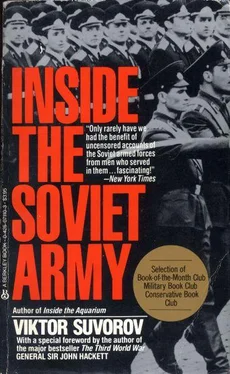Discipline in a training division is almost unbelievably strict. If you have not experienced life in one you could never imagine what it is like. For instance, you might have a section of non-smokers headed by a sergeant who does smoke. Every member of the section will carry cigarettes and matches in his pocket. If the sergeant, apparently without realising that he is doing so, lifts two fingers to his mouth, the section will assume that he is in need of a cigarette. As one, ten trainees will rush forward, pulling cigarette packets from their pockets. The sergeant hesitates, considering which of the ten stands highest in his favour at that moment, and finally selects one of the cigarettes he is offered. By doing so, he rewards a trainee for his recent performance. Ten packets of cigarettes disappear in a flash; in their place appear ten lighted matches, held out for the sergeant's use. Once again he pauses, looking thoughtfully from face to face — whom to reward this time? One match goes out, burning the fingers of a young trainee, who stoically endures the pain, even though it brings tears to his eyes. The sergeant accepts the light offered by the soldier next to him and puffs contentedly away.
Each day the sergeant picks one of the trainees and puts him in command of the others. The trainee must spend the day devising fresh torments for his fellows. If he really distinguishes himself by his inventiveness, he will receive the greatest honour of all — he will be allowed to polish the sergeant's boots that evening. The trainees fight a silent battle among themselves, every hour of every day, for this privilege.
Power depraves those who wield it and a sergeant in a training division is as depraved as it is possible to be. He uses his power to manipulate his subordinates, gradually turning them into real man-eaters.
Service in a training division is the pipe-dream of many Soviet officers. It is generally believed that in a training division one does no work at all. But this is not true: I know because I have served in one. The work is sheer drudgery. It is true that you never need to teach the trainees anything — their sergeants do that. It is true that every square metre of asphalt is scrubbed with toothbrushes. It is true that the floors in the lavatories shine almost as brightly as the sergeant's boots. It is true that no sergeant will ever step out of line, for fear of being posted to a combat division.
Against all this, however, the number of suicides in the training divisions must exceed the figures for any similarly-sized group of people anywhere else in the world. If a trainee in your platoon or your company kills himself, your own record of service will carry a black mark. And this black mark will never be erased. Each officer must therefore keep a constant watch on each of his trainees. As soon as he spots the slightest indication that something is wrong he must take action. He must pick out and give power to the trainee who appears to have reached the end of his tether and to be about to turn on his platoon, to blaze away at them, at his officers and at anyone else nearby and then, calmly changing the magazine, to send another long burst ripping through his own young body.
But how can you watch them all? Can you get to the right one in time to make him so drunk with power that he will resist the temptation to kill himself?
1
Some say that before the Revolution the Russians were slaves in chains. Many believed this and many others still do so. Napoleon was one of these and he decided that he would conquer the country by winning over its down-trodden serfs. As he entered Russia, therefore, he published a manifesto, freeing the peasantry from serfdom. However, for whatever reason, the Russian peasants did not view him as a liberator and they ignored his edict. More than that, they rose against him, everywhere he or his armies appeared. Eventually they drove him from Russian soil, ignominiously abandoning his armies as he did so.
The Communists claim that they liberated the Russian people. Yet, when the war began, these same Russians greeted their foreign invaders with tears, with flowers and with enthusiastic hospitality. What can have brought them to the point at which they would greet even Hitler as their saviour and liberator?
The Soviet forces surrendered to Hitler in regiments, divisions, corps, and Armies. In September 1941 the 5th, 21st, 26th, and 37th Armies surrendered simultaneously and without resistance. In May 1942 the whole of the South-Western Front, the 6th, 9th and 57th Armies, the 2nd, 5th and 6th Cavalry Corps, the 21st and 23rd Tank Corps surrendered in the Kharkov area. They fought for four days and laid down their arms on the fifth: At the same moment, the 2nd Shock Army capitulated on the North-Western Front. What is more, they then turned their weapons against the Communists. Soldiers, officers, and generals of every nationality of the Soviet Union surrendered, although the Russians were the most numerous, both in numbers and as a percentage of the total Russian population of the country. The Russian Liberation Army was the largest of all the anti-Communist forces, drawn from the inhabitants of the pre-revolutionary Russian Empire, which were set up during the Second World War. By the end of the war it consisted of approximately one million Russian soldiers and officers, who had chosen to fight against the Soviet Army. It could have been still larger than this, but Hitler would not give his wholehearted support to Lieutenant-General A. Vlasov, the leader of the Russian anti-Communist movement. With unbelievable short-sightedness, he embarked upon a bloodthirsty campaign of terror against the inhabitants of the territories occupied by his armies. Compared to the liberation and collectivisation campaigns carried out by the Communists, this terror was relatively mild, but it deprived Hitler of any hope of winning the laurels of a champion of freedom.
But the Communists were not idle. They did everything they could to retain power and to prevent the total collapse of the Soviet Army. On 13 May, 1942 the murderous `Smersh' organisation — a military counter-intelligence service, operating independently of the NKVD — was established. Its most important task was defined by Beriya on 15 May as `fighting attempts to revive a Russian Army'. That same day a new law on hostages was enacted, decreeing that the relatives of Soviet citizens who joined the Russian Liberation Army could be imprisoned for twenty-five years or shot. A day later new guidance on penal battalions was issued.
Penal battalions existed already but not in the form now envisaged. Nor had there ever been as many of them as was now proposed. Their final shape was decided upon in May 1942. The original proposals were confirmed and they have not changed from that day to this. Let us look at them more closely.
2
The old Russian Army had a good tradition: if its soldiers considered a war to be a just one they would fight like lions. If they believed it to be unjust and unnecessary for the Russian people, they would simply stick their bayonets in the ground and go home. That is what they did in 1917 and they did it again in 1941. Millions of Russian soldiers could see no reason to defend the Communist regime. Proof that this was a widespread attitude was provided by the Armies who gave themselves up. The same opinion was shared by hundreds of thousands of Ukrainians, who established the Ukrainian Insurgent Army, by Cossacks, Georgians, Lithuanians, Latvians, Crimean Tatars and by many other peoples who, before the Revolution, had fought fearlessly for the interests of the Russian Empire against every foreign invasion.
The Communists are clever people. They saved their dictatorship in a most original way — by developing a new use for penal battalions, which proved to be a decisive force in the battles with the German army. The Germans choked on the blood of the Soviet penal battalions. Also, with the help of the penal battalions, the Communists destroyed millions of their potential and actual domestic enemies and put an end for several decades to the growth of disobedience and resistance to their regime.
Читать дальше












